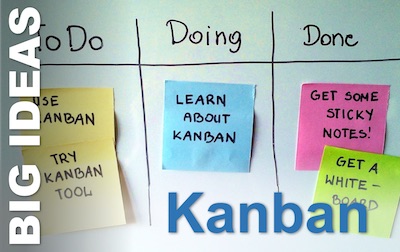In last week’s Pocketblog, we looked at the 5S approach to ordering and organising a workspace, introducing five Japanese words: seiri, seiton, seiso, seiketsu, and shitsuke.
It struck me that there are an awful lot of Japanese terms that have enriched our business language, so I thought I’d list a few more. Of course, readers of the Pocketblog will also probably be familiar with gemba too.
I think that some of the concepts that they raise are absolutely fascinating – and necessary to us in the West. Let’s look at a few more, some familiar, some little known.
Hourensou
Collaboration and information sharing. Keeping others informed.
Kaikaku
Radical change. The opposite of…
Kaizen
Continuous flow of incremental improvements.
Kanban
A progress tracking approach that follows instances through a process. Literally ‘billboard’. Increasingly used in project management and team workflow. There is a lovely (free) web-based app called Trello that works on Mac, PC and mobile app formats.
Karoshi
Literally: ‘death from overwork’. Don’t!
Kyosei
The spirit of co-operating for the common good.
Meikiki
Perception and foresight, coupled with good judgement.
Mottainai
The sense of regret when we become aware of waste and failure to use well any things of value. (I am so glad I now have a word for this). It comes from the concept, ‘mottai’ that things have inherent value, or dignity. Nice.
Muda, Mura and Muri
… are the three forms of waste
- Muda
Wasted effort
- Mura
Inconsistency
- Muri
Unreasonable – even ridiculous – requirements
Nemawashi
Literally, ‘going around the roots’. Refers to the informal stakeholder alignment and political process that lay the groundwork for effective consensus or change.
Pecha Kucha
Currently popular style of presenting, with 20 slides, each lasting 20 seconds. Gives a fast and dynamic way to present an idea. Pecha Kucha nights often consist of a dozen or more presentations. Literally, ‘chit-chat’.
Poka Yoke
Making error proof. Creating something so that mistakes cannot be made.
Tatemae
Public truth. The things that are appropriate to share in a public situation. It literally means ‘facade’ and we might contrast it with ‘honne’, meaning your true feelings. Puts me in mind of the Johari Window.

 How do you adapt traditional project management into a rapidly changing environment? One that is characterised by shifting priorities and high uncertainty. Arguably, you don’t need to – project management has always had the tools for this. But, with the Agile Manifesto of 2001, software projects have a new paradigm. A modification of traditional approaches, called Agile Project Management.
How do you adapt traditional project management into a rapidly changing environment? One that is characterised by shifting priorities and high uncertainty. Arguably, you don’t need to – project management has always had the tools for this. But, with the Agile Manifesto of 2001, software projects have a new paradigm. A modification of traditional approaches, called Agile Project Management.
